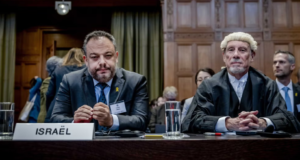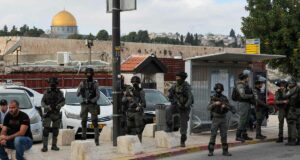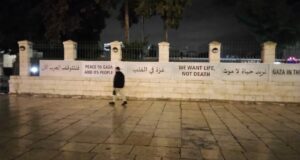Credit: Maureen Clare Murphy
More than 70 journalists, activists, and members of the diplomatic corps met on September 6th at the Ambassador Hotel in Jerusalem for a press conference regarding the Campaign for the Right of Entry/Re-Entry to the occupied Palestinian territory.
The event was organized in conjunction with the Israeli-Palestine Center for Research and Information (IPCRI). The purpose of the press conference was to engage Israeli officials on the issue in the presence of foreign representatives. No Israeli government representatives, however, were present. A US consulate spokesperson emphasized that the consulate was aware of the visa freeze policy and that the issue was being raised at the highest levels.
The Committee for the Protection of Foreign Passport Holders Residing in and/or Visiting the Occupied Palestinian Territory (CPFPH), launched in June 2006, has stepped up its campaign against the Israeli Occupation authorities’ policy of denying entry to residents of and visitors to the OPT (Gaza Strip and West Bank) who do not hold a Palestinian ID issued by the Israeli Interior Ministry. A Palestinian ID is a personal identification document issued by Israel for Palestinian residents and their children.
IPCRI co-director Gershon Baskin and campaign activist Sam Bahour highlighted the current Israeli “visa-freeze policy”, which is being widely applied at the Israeli controlled border crossings to the occupied territory. “This is one of the more blatantly unjust and blatantly stupid things the government of Israel has ever done,” said Baskin.
Since the start of the Al Aqsa Intifada in September of 2000, Israel has stopped accepting Palestinian applications for family reunification in the West Bank and Gaza as one method of controlling Palestinian demographics. According to B’Tselem, Israel has practiced this method of control on and off since 1967 and now has a back-log of at least 120,000 applications it is refusing to process. Israel, not the Palestinian Authority, is and has always been in control of the Palestinian population registry.
Antigona Shkar of B’Tselem presented findings and individual video testimonies from a joint B’tselem-HaMoked report, published in August, entitled “Perpetual Limbo: Israel’s Freeze on Unification of Palestinian Families in the Occupied Territories.”
Prominent Palestinian businessman Zahi Khouri (chairman of the National Beverage Company) spoke of the ramifications of the freeze policy on the Palestinian business community and called on foreign missions to press Israel to end its closed door policy.
Campaign for the Right of Entry/Re-Entry to the oPt representative Basil Ayish called for action targeted at foreign representative offices as well as the Israeli government. “We declare our insistence on the most basic human rights,” he said. “We demand that Israel immediately stop separating Palestinian families; we demand that Israel stop discriminating against those wishing to enter Israeli-occupied territory, and we expect embassies to protect and defend their citizen’s rights to travel freely through Israeli ports.”
For a comprehensive report on the meeting, go to http://www.ipcri.org.
Contact Person: Rima Merriman, Campaign for the Right of Entry/Re-Entry to the OPTs. Telephone Number: ++972 0599 274 758
The campaign has just brought out a factsheet and a call to action flyer, both for popular distribution in English.
The campaign’s forthcoming site can be accessed at: http://www.RightToEnter.ps
On Wednesday 6th September Sam Bahour gave a radio interview on the ethnic transfer of Palestinians out of Palestine. In a poignant testimony to this escalation of Israeli policy Sam Bahour’s aunt and uncle were denied entry at the Allenby Bridge yesterday. They left their home in El- Bireh/Ramallah, where they had been visiting for about 3 months from the US, to go to Amman for two days for some business. Upon attempting to re-enter, they were both “denied entry” and told to get a permit from the Israeli military in order to be able to enter. Of course, the soldier forgot to tell them that the process to get a permit does not work. This case is an addition to the growing list of thousands of Palestinians who are denied entry to their homeland to further the Israeli policy of transfer.
Electronic Intifada has an extremely comprehensive index of report on this topic, which can be accessed on their site.
 International Solidarity Movement Nonviolence. Justice. Freedom.
International Solidarity Movement Nonviolence. Justice. Freedom.



